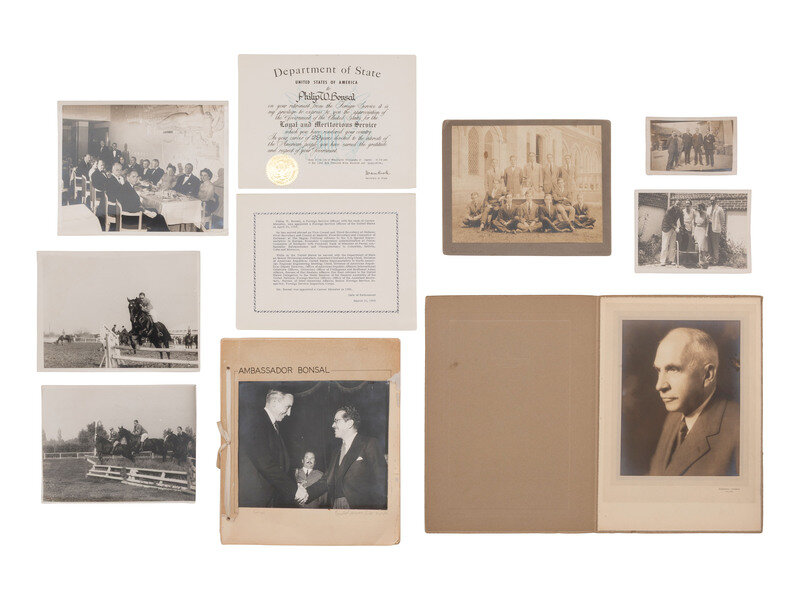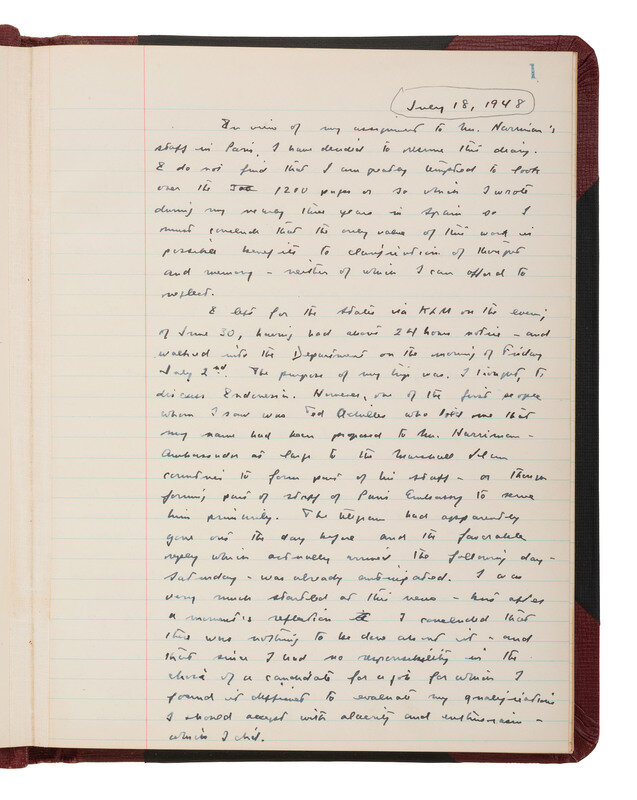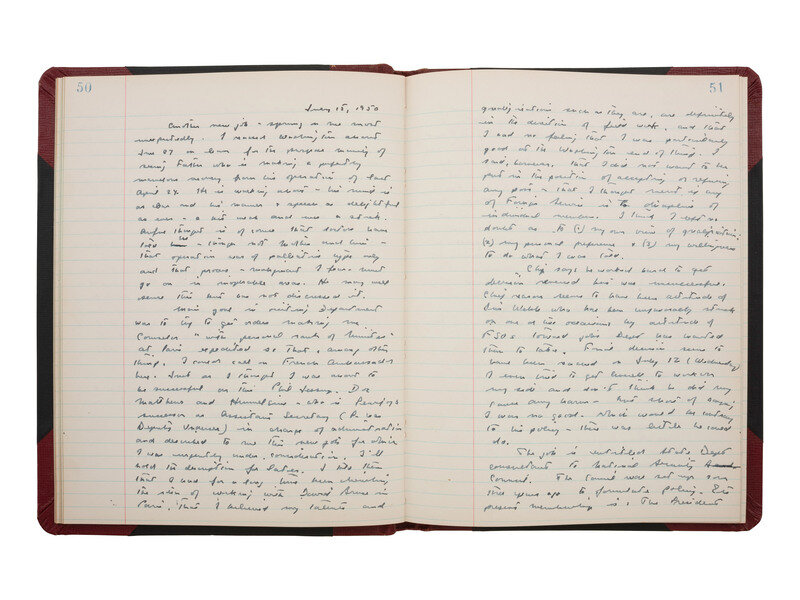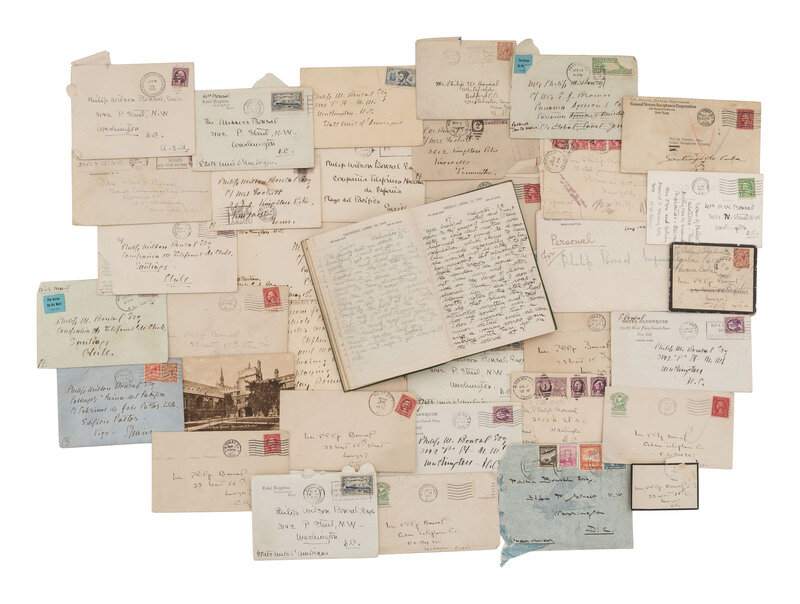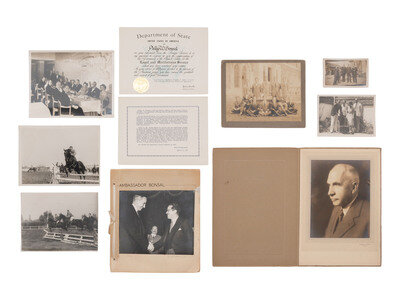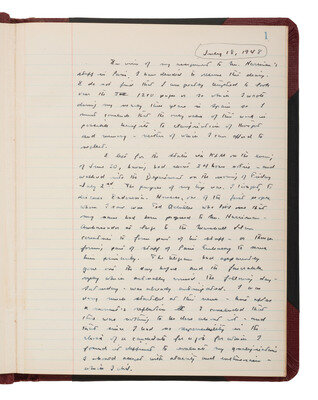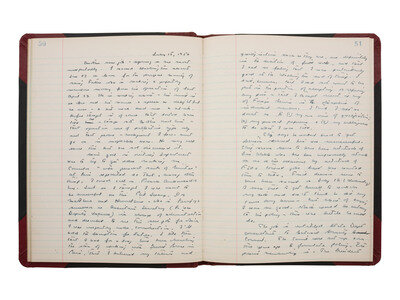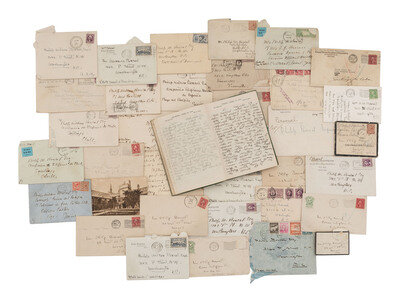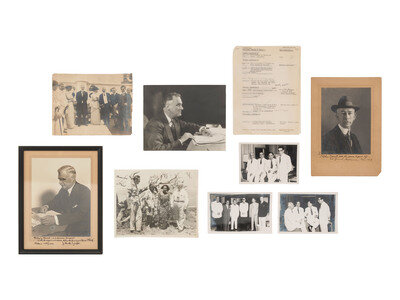Condition Report
Contact Information
Auction Specialist
Lot 175
Sale 6425 - American Historical Ephemera and Early Photography, including The Larry Ness Collection of Native American Photography
Part I - Lots 1-222
Oct 23, 2025
10:00AM ET
Part II - Lots 223-376
Oct 24, 2025
10:00AM ET
Live / Cincinnati
Own a similar item?
Estimate
$1,500 -
2,500
Price Realized
$4,500
Sold prices are inclusive of Buyer’s Premium
Lot Description
[POLITICS]. Extensive archive of correspondence, photographs, and other ephemera related to Philip Bonsal, his family, and career in the US Foreign Service.
Philip Bonsal (1903-1995) whose career in the US Foreign Service spanned 32 years, was the last US Ambassador to Cuba, serving from 1959-60. He was also US Ambassador to Columbia (1955), Bolivia (1957-59), and Morocco (1961-62). He descended from a distinguished American family, including founding fathers Gouverneur Morris and Thomas Jefferson. His father, Stephen Bonsal, Jr. (1865-1951) was a war correspondent for the N.Y. Times during the Spanish American War, Secretary of Legation and Charge d’Affairs in Madrid, Tokyo, and Seoul from 1893-7. An adventurer, he flew in balloon races, and once tested a submarine in New York Harbor. As a Lt. Colonel in the AEF during WW1 he was associated with the forerunner of the “Psychological Warfare” unit. During the negotiations leading up to the Treaty of Versailles he was interpreter for both Woodrow Wilson and Colonel Edward M. House. Wilson ordered Bonsal to keep a diary of secret meetings they attended. In 1944 he turned this diary into book form entitled “Unfinished Business, Paris Versailles 1919.” For this work he was awarded the 1945 Pulitzer Prize in History. His wife was Henrietta Fairfax Morris, a direct descendent of US founding father Gouverneur Morris, was the sister of novelist Gouverneur Morris IV. Philip’s brother, Dudley Baldwin Bonsal (1906-95) was a US District Court Judge. Another (half) brother was Stephen L. Bonsal (1894-1950) among the four US Army pilots that inaugurated US airmail service in May 1918.
The collection is highlighted by the following diaries:
A wonderful 68-page diary (1948-50) by Philip Bonsal as Political Advisor to the US Special Representative in Europe (i.e., Averill Harriman) who headed the Marshal Plan. Great content detailing the negotiations surrounding the implementation of the plan. In part: “July, 18, 1948 In view of my assignment to Mr. Harriman’s staff in Paris, I have decided to resume this diary …We have [oversight] of 16 countries [Bonsal details meetings, people, needs of Scandinavian countries] “… don’t feel a change in Sweden’s position would immediately result in soviet aggression… don’t feel our East West trade policies primary factor in Finland…relinquishing some of their defense commitments- extreme dependence on us of UK & all West Europe. I hope we are not stressing military angle too much… [Discusses a meeting to discuss setting up an E(ast) W(est) trade group and talks at the Hague.] S_ is trying to get cabinet approval for a proposal to liberalize trade and currencies though W. Europe including W. Germany, but not U.K… $200M made up of contributions from country’s gold reserves and from us. My fellow delegates in E.W. trade, and Harriman & Forrestal sent me a memo… to general effect that proposal I made with Ed Martin’s approval at yesterday’s meeting was more or less selling our position down river. So we had a meeting in Averill’s office… [Discusses lunch with Milt Katz, a WWII OSS operative & Deputy Chairman of the Marshall Plan)]. “… he sees at end of war we & Britain & French & Soviets agreed that we would sit on Germany. Then Soviets moved away- we are only potential obstacle to them as Britain and French are very weak… Our ineffable Senator [Elmer] Thomas has caused something of a stir by advocating the rearmament of some German divisions. .. Soviets have already erected a military force in their area of Germany. Le Monde editorial … envisaging eventual armament of Germans… functioning at the direction of a Western European high command… [W]e should [further] European integration in the military field in the face of the Soviet menace. .. [Sir Edwin] Plowden explained to Milt the general British feeling that in the war- Britain had been left on her own when the continent folded up in 1940, that help had come only from the Western Hemisphere. We will gladly go as far as you will in association with W. Europe but no farther. In Milt’s judgment… only we can provide leadership in Western world. I don’t go along with such a sweeping generalization… Hector Prud’homme dropped in… says we are asking Germans to assume large and undefined obligations of military governance... He feels things in Germany are at a delicate balance. My view is that we have gone further for Germany… than they have any right to expect…” “lengthy presentation to Averill and Milt by Roscoe Drummond and his information boys…. Strongly endorsing a proposal… of transportation facilities in Africa south of Sahara & making suggestions on how it can be done... & how Union of South Africa might be brought in….[D]inner at embassy for Sec. of Defense Louis Johnson, a heavy, tired looking man… told me he’d heard a lot about me… General Bradley also there, a very real person [mentions more names]… sat next to Jim Bruce- none of David’s charm, heavy set & rather gross- spoke incessantly about what he told Truman about such matters as representation allowances for F.S.O… I expect he and [Juan] Peron hit it off personally very well…Col. [Bill] Donovan with David Bruce landing on the coast of Normandy in the early invasion days. Col. had been specifically invited not to be here. They ran into Gen. Bradley who says “what are you doing here’ with some emphasis to which Col replies: “I just wanted to present David Bruce to you! … John Newman in town. He thinks integration will come only if we force it… Genl. [Walt] Rostow [OSS WWII] dropped in. He is taking Walter’s place at Geneva with [Gunnar] Myrdal [Nobel Prize Economics]. I used to know him when he was helping Dean in the Dept.- very clever and more sensible than Walter… He says US currency policy is becoming increasingly unpopular in Europe. He [referred] to story that… French-Soviet trade negotiations were improved because France, under US pressure, refused to deliver three tankers to the Soviets. I said… unlikely Soviets should have broken off because of three lowly tankers… I reiterated our policy support for U.N… [Robert] Marjolin [i.e., Sec. Genl. of OEEC] sent a paper to [Paul] van Zeeland [Belgian statesman] making two minor suggestions and three points not acceptable. [Bonsal then details Marjolin’s unacceptable proposals and those Van Zeeland accepted] “. .. An important factor in the whole situation is [Belgian Prime Minister Paul-Henri] Spaak’s own position… [Roger] Ockrent doesn’t know where it stands. Belgian internal situation due to the upcoming consultation on the royal question is very tense. Spaak does not want to eliminate himself from internal politics… plenty of people who would like to see him out… Britain’s attendance is highly important. [Ernest] Bevin [British Foreign Secretary] rather double crossed both Acheson and Hoffman on this [Bonsal then details Bevin’s duplicity] … Harriman told me later in the day that Paul Hoffman takes [an] extremely serious view of British attitudes- which continues to be one of non-support and non-opposition. He has gone so far as to intimate this might be a touchstone of British cooperation and … could result in a loss of aid to Britain. We are to pitch this very strong[ly]… Douglass reminded [Clement] Attlee of [Sean] Macbride’s offer to resign his post as Vice-Chairman… Attlee favors our sending our message—Why?” [Bonsal then details negotiations with top reps, in trying to reach agreement between everyone] “…Acheson plans to send his message to all PCs, that he and Hoffman attach very major importance to proposal regarding it as real test of cooperation… Ockrent very worried at Van Zeeland’s complete failure to keep touch with Spaack on this subject. He described Van. Z. as being like a slippery piece of soap in a bath tub. He admits we did all we could to force this issue… Called on Harriman and gave him full account of meeting with Van Zeeland giving my own feeling about Van Zeeland and his relationship to Spaak “… ECA Frankfort has laid a nice hot potato for us. The have hired a man named Lovell… he turns out to be one of those mentioned by [Whitaker] Chambers in the [Alger] Hiss trial as member of apparatus [i.e., communists] in 37-38. Foster came to me with telegram ordering his appt. cancelled and having him sent home at once. I held this up. I’m not sure yet what should be done… Frankfort had no legal right to take the man on & therefore personal action taken null and void. I don’t see why we should have to send him home and thus underline our boner….” “… We should oppose any further evading of Geneva side committee until Russians really produce information as to what they have to sell and on what terms…. [The] fact Myrdol is sold on Soviet thesis is disturbing… more data on Soviet economic practices so as to be able if necessary to make an all out attack on them again… “…Paul [Porter] views are most interesting on Greek political situation— what socialists there are are in the hands of the communists and social democrats are something else entirely [Bonsal details more on the Greek situation]….” “ Lunch at Embassy for Congressman Pfeiffer, Gordon and Zablocki of Foreign Affairs Committee… Gordon seems to be quite pro-Franco for strategic reasons. ..” French Morocco matters at a crisis… The whole crisis is tied in with activities of an American named [Robert E.] Rodes who has persuaded a lot of congressmen to his view. Case rests on our treaty relationship with Sweden and theory that acts of protecting persons can only apply to us with our consent… I expect pretty galling to the French. In effect it claims for Americans very special position in N. Africa….” Situation in Belgium around the royal question is very tense indeed… Carton de Wiant, brother of Defense Minister, stated at British Embassy that British opposition to idea of Spaak’s working in OEEC was due to British opposition to return of Leopold, i.e., they wanted Spaak in Belgium leading opposition to Leopold… In Milt’s office heard Congressman [Jacob] Javits hold forth… he made a great deal of sense on ECA problems and merits of participating countries.… all tremendously impressed with Italy; They feel that France has to be sustained at all costs and they are… highly critical of Britain. Javits feels strongly on British behavior in the Near East [and] thinks this is a mistake… that Congress may try to influence appropriations for individual countries. He favors a global appropriation… Turner told me Ernest Hemmingway is in town. Must try and get in touch with him. We are having a bit of trouble with Dutch counterpart.…
[In July 1950 Bonsal was called back to D.C. and initially tasked as State Dept. Consultant to the National Security Council] “The council as set up three years ago to formulate policy. It’s present membership is: The President, who presides, Secretary of State and Defense (Johnson), Chairman of National Security Resources Board (Symington) and such other cabinet members and others as may be drawn in. Harriman… will play a most important roll… Lunch with James Lay [Exec. Secretary of Natl. Security Council. Bonsal describes Lay, his staff, etc..] The dairy concludes with pages devoted to the death of (and relationship with) his half-brother, Stephen. Exeter, Yale (1914), athletic, WW1 aviator (Capt. signal corps) “He made a number of records, had some forced landings and got a lot of publicity… at the Armistice was in command of a squadron of night bombers…. After Pearl Harbor joined Air Corps as a Capt., retired as Major… etc.”
Another dairy [Dec.24, 1918 to June 29, 1919] by Philip was written during his time at St. Paul’s School in Concord, N.H.,, family interactions, etc. Some good content; 1920 certificate of merit signed by 10 professors St. Pauls, including Godfrey Brinley, a top US Tennis player in the 1880s (he lost the singles US championship game to Richard Sears in 1885).
[With:] Original photos, some signed and inscribed, including: 19.5” x 25.5” official photographic portrait print of President Roque Saenz Pena (1851-1914) of Argentina signed & inscribed (as President): “al Senor Bonsal, Roque Saenz Pena, Mayo 22, 1912.” ; Large mounted image (overall size 21 x 17) of Joseph McKenna (1843-1926) as US Supreme Court Justice pictured in his robes. Signed “Joseph Mcenna” on the mount.; Mounted S&I silver-print portrait 10” x 12” March 10, 1952, “For Phil Bonsal with warmest Regards David R. E. Bruce [as US Amb. To France]; S&I mounted photo, 8.5 x 11.75, picturing Colonel House during the WW1 peace negotiations. House writes “To Stephen Bonsal with the warm regards of his friend . E. House, Paris 1919”: mounted photo of Stephen Bonsal in a wheelchair recovering from a head wound. Bonsal writes on the back “after I had my head cut open in Caracas 1903”; 12 x 15 silverprint photo of the portrait of Pocahontas (unknown painter) taken from the 1616 engraving of her by Simon van de Passe; early silver-print photo taken from an early 1850s Dag. of Frances Leigh Bonsal ID’d by Col. Stephen Bonsal on jacket “On the right my mother Fanny Leigh- several years before her marriage- June 7th 1855. When she was 17… Stephen Bonsal, Nov. 1927”; Large (10” x 14”) photos of Stephen Bonsal, including one of his deceased sister signed by Stephen “Photo of my dear sister Fanny- Mrs. Walter B. Brooks- who died in May 1926- taken a year before her death Stephen Bonsal May 1927”; Mounted silverprint photo of an Army officer’s wedding party [IDd on reverse in S. Bonsal’s hand “Nagasaki, July 1916, Capt. Commiskey & Wedding Party”’; Two 7” x 10” photos, presumably Fanny Leigh Bonsal by Harris & Ewing; Large scrap w/ appx. mounted 30 photos of Bonsal (some with Bolivian President Herman Siles Zuazo) with newspaper clippings during the ceremonies presenting his credentials as US Ambassador to Bolivia in May 1957. Framed S&I photo by J. Butler Wright (1877-1939) as US Amb. To Cuba “Habana, 1938/1939, To Philip W. Bonsal – and, of course, Margaret- with the regards and esteem of his old friend and first “Chief.” Wright died at his post in Habana less than a year later.; RPPC of Fred Chubb w/ writing on reverse “my cousin Fred chubb, soldier of fortune, Chief of Staff of Detectives to President Estrada Cabrera of Guatemala.”; Envelope of photographs of Bonsal and other leaders while he was the State Dept. Director of Philippine and Southeast Asian Affairs; group of 1932 b/w photos, Santiago Chile, of Phil on horse, jumping w/ future WW2 General; man hunting w/ gun photos and 1920s sea plane on lake with people, etc.
[With:] Large group of letters and documents going back to the 18th century, including:
Over 100 letters from Philip’s wife, Margaret, from various places (interesting express and airmail stamps); A couple of long ALSs, Aiken S.C., [1917 and 1919] to Phil from his uncle, novelist Gouverneur Morris, in part: “Your prize article in a piece of first rate writing… our famous great uncle Thomas Jefferson to the contrary notwithstanding. If ever a boy was born into the work with a pen in his mouth (I wish it might have been a little crowded by a golden spoon) you were. Your father writes, no one writes better than your mother, your affectionate uncle writes.. His father wrote.. your great-great grandfather wrote the Constitution of the United States, and of course T. J. wrote the Declaration…. Philip, it is not likely that we shall ever again have a President who is so un American that he thinks he can over-reach the constitution, disregard the voice of the people as expressed at the polls, and make treaties all by himself. It is not likely, but it is possible. Wherefore, if Mr. Wilson had brought home a more perfect instrument, even, it would still be the duty of the Senate to perform, understand its constitutional duty in adopting that treaty to the law of the land. We cannot have the same forces which pulled down a German William sitting up an American Woodrow. If you think that any League can do away with war, while the human heart remains black, that is your opinion. It is as worthless as mine, which is the opposite. And if you think that war ought to be done away with, again, we clash, but only in opinion… Mr. Hickcock, who now thinks it is our business to have a meddlesome finger in every European pie, once thought it our business to put an embargo upon munitions for the allies! Mr. Wilson was too proud to fight once; then he wanted a peace without victory etc. etc… now they are getting for a Leauge of Nations, and why I ask you shouldn’t they be just as fallaciously wrong about that? … [re future war] Let us hope that our national conscience, and not the conscience of some other nation, shall be our guide…..”
Appx. 30+ letters from Stephen Bonsal (signed “Dad”) including: July 8, 1935 ALS, Paris, ”… we shall keep out of the Abyssinian fracas [i.e., Ethiopia and Italy Walwal incident] but have an eagle eye on the European situation. Of the former- Century published my yarn “Lawrence of Arabia” about July 22nd—put a copy aside for me….” ; Feb 1, 1935 TL and ALS “… re your report on the Chilean foreign Debt … shall I have copies made for Roper Sec. of Commerce and for Walton Moore Asst. Sec. of State who frequently refers in great praise to your memo. Some aspects of the Roosevelt policies “I am also sure that Francis White… would welcome it and would make use of it….”; TLS, April 4, 1935, re organizing the Fed. Communications Commission (FCC) ”… [Anning S.] Prall will run the whole shooting match and he and Senator Wagner of N.Y. besides your record and your writing are your best backing and support… do not think that Sykes was helpful … he was about to be demoted… Prall told me the investigation would surely last 18 months and might last forever….” ALS, March 26, (1935): “… What you say about the bitterness of the corporations against the New Dealers is perfectly true, but they will get over it. I recall when Frank Kellogg was made Chief Trust Buster by Theodore Roosevelt they always spat when his name was mentioned. Two years later they were glad to secure his legal services & were glad to pay him large fees….” Oct. 11, 1933 ALS “… the day after I saw him I hear indirectly Colonel House was not very well and they took him to his daughter’s out on Long Island for a rest, thus missing the lunch with the President upon which he counted much as did I fear many of his henchmen….” ALS, Paris 1935: “I have put in several mornings at the Herald library reading some of my 1890 dispatches from the Balkans- I wish we filed in New York at once… as I found many interesting and long forgotten dispatches….” Additional letters in1936 discuss the tragic death of Stephen Bonsal White (Phil’s cousin) and complement Philip’s work “… More of [?] talks with Commissioner Walker… there is no doubt that he was greatly impressed by your presentation of some aspects of the Roosevelt policies as were [Colonel] House and [Daniel] Roper….“ Long ALS, June 2, 1935 from Brit. Embassy staffer signed “Bill” to Phil Bonsal sharing gossip between their two embassies “…Hoffman Philip is not definitely appointed Ambassador and the Embassy is to remain in the charge of your old friend Ted Scott [in fact, Philip, a rough rider and friend of Teddy Roosevelt, became US Ambassador at Chile later that year]…; 2 pg. friendly ALS, circa 1943, The Under Secretary of State lthd, by Sinclair Weeks w/ later 1991 pencil notation by Phil “I think this letter was written to me in August of 1943, give or take a month. A few weeks later S W was dropped by FDR- to the glee of Cordell Hull….”
Folder of letters from Spanish sculptor Sebastian Mirando, one describing a sculpture he did’ 1938 ALS, Mary Morris (daughter Civil War general & WI Gov. Lucius Fairchild); Appx. 40-50 letters (1850-60s) letters to and from Mary E. Baldwin (1834-1922) and Ohio Merchant Dudley Baldwin (grandfather of Gouvernuer Morris IV) re Mary’s stay with her uncle General Daniel Brinsmade in Connecticut and the controversy surrounding the Frederick Gunn School. Includes letters from her brother Homer Baldwin, a Union Artillery Officer who assisted mortally wounded CSA General William Barksdale following his charge at Gettysburg; civil war prints; 1857 DS (legal case) signed by Benj. F. Butler (US Atty. Genl.) and Curtis Noyes and others; Autograph signatures & letters (e.g., Henry Clews, Russell Sage, Alonzo B. Cornell, Edmund Yates, C. B. Tompkins, J(oseph) R. Underwood, James W. Ellsworth, Chauncey Depew, Buxton (Gov. Genl of the Union of South Africa), Earl of Liverpool (Gov. of Ireland, Gov. Genl. New Zealand); Thomas F. Bayard 1888 DS as Sec. of State certifying a US consul at Stuttgart Germany; 1892 ANs, James G. Blaine sgd “J.G.B.” soliciting recipient’s viewpoint; MSs 1934 Xmas greetings by author Hendrik Willem van Loon; 1884 ALS Ben La Fevre on House or Reps Lthd.; Vellum (or cowhide) hand-colored document signed by the top police officials in Bolivian to Bonsal upon his departure as Amb. to Bolivia in 1959; Other letters and signed cards by various ambassadors and other foreign heads; Multi-signed vellum document, Feb. 4, 1959, by the officers and staff of the US Embassy on Bolivia to Phiip Bonsal upon his departure as Ambassador; Several letters in the 1920s to Phil from “Betty” [Elizabeth Lambert Cushman Fish] wife of Dr. George W. Fish, Gold medalist on US Rugby team in the 1920 Olympics. The TV show “Dr. Kildare” was fashioned after Dr. Fish’s real life practice; Original 16 x 18 charcoal (or pen & ink quash?) portrait of Julian R. Caceres (1851-1950) Honduran Amb. to the US dated (Dec. 25, 1949) and signed by Caceres and the artist (name indecipherable); 1919 TLS from Col. Edward M. House re article Phil wrote.
[With:] Misc. documents: a partial document (circa 1720) concerning 50 acres in the bowery (N.Y.) and referencing Francina M. Harman of Maryland, Augustine Harman of Bohemia and a patent by Richard Nichols, Govnor Genl., and James Duke of York and Albany [not signed]; 10 x 16 manuscript invoice, Aug. 15, 1785, for ship rigging & materials for a new ship (Molly) carried on board the ship Betsey for Robert Ewing at Cambridge, MD; two vellum land grants Millard Fillmore (secretarially signed) for War 1812 veterans (poor condition); 4 vellum commissions (1913-14) from the Governor General of the Philippines for four different positions held by Stephen Bonsal in the Philippines, with transmittal letter; WW1 postcard scenes; mid-18th newspapers, including supplement to The Salem [NJ] Sunbeam with Millard Fillmore’s Dec. 1852 state of the union address (discussing planned expedition to Japan to open up trade);photo w/ negative of crashed plane with swastika on tail; 1865 Loyal Publication Society pamphlet Reconstruction titled “Letter to President Johnson”; mounted photo of statue w/ cannon; Map of France Divided into Circles and Departments. Phila., published by J. Stewart & Co. Feby. 17, 1798 [from Matthew Carey’s atlas]- tear but complete; 19th century season tickets pass headed “Ladies” sgd by John Morrissey; Marshal Fochs calling card; Meritorious Service Award Cert. from the State Dept. to Philip Bonsal upon his retirement in March 1965, listing all his career positions; 1922 RPPC of Phil Bonsal w/ classmates; 1950 National Press Club membership card for Stephen Bonsal; Mrs. Taft at Home White House visiting card; Cabinet card of a young Wm. E. Russell (future Govr. Mass); tin type man smoking Mershcum pipe; 1874 tally sheets for Republican Primary Election in Ohio; and much more. A collection worthy of additional research.
This lot is located in Cincinnati.
